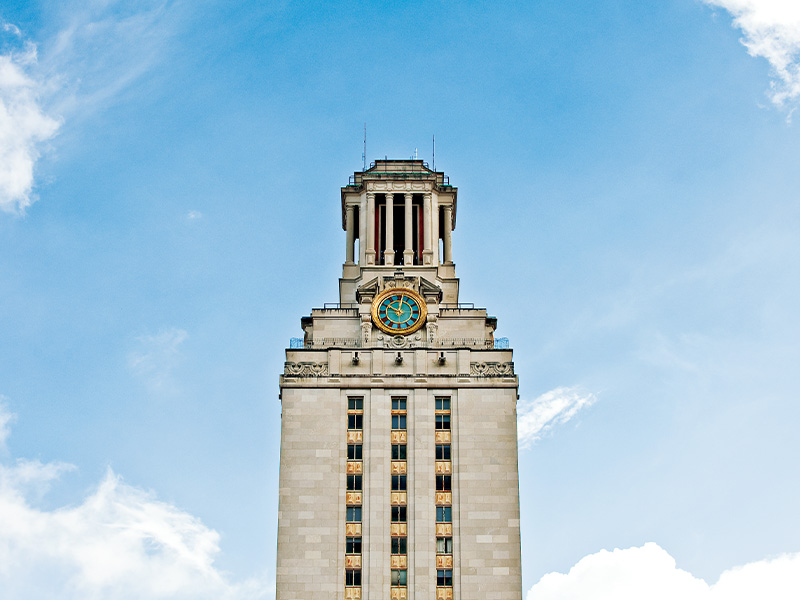
Four Cockrell School of Engineering professors, along with 68 other faculty members within the University of Texas System, were recognized with a 2010 Regents’ Outstanding Teaching Award during a ceremony held on the UT campus Aug. 11.
Cockrell School recipients are:
- Wallace T. Fowler, Ph.D., P.E., professor of aerospace engineering and engineering mechanics, the Paul D. & Betty Robertson Meek Centennial Professor of Engineering, University Distinguished Teaching Professor, Department of Aerospace Engineering and Engineering Mechanics
- Desmond F. Lawler, Ph.D., P.E., professor, the Bob R. Dorsey Professor of Engineering, University Distinguished Teaching Professor, Department of Civil, Architectural and Environmental Engineering
- Kristin L. Wood, Ph.D., the Cullen Trust Endowed Professor in Engineering No. 1 and University Distinguished Teaching Professor, Department of Mechanical Engineering
- Carolyn Conner Seepersad, Ph.D., assistant professor, Department of Mechanical Engineering
The awards, which range from $15,000 to $30,000 and total $2 million, are given to faculty who demonstrate extraordinary classroom performance and innovation at the undergraduate level. This is the second year the awards have been given.
“We believe in rewarding excellence, but we also believe in setting rigorous standards in our teaching awards,” said David B. Prior, UT System’s executive vice chancellor for academic affairs. “Therefore, we know these educators incorporate the very best teaching methods and that they impart cutting-edge concepts and information based on scholarship and research.”
Explaining complex ideas in everyday terms
The time that each of the Cockrell School recipients has spent at the University varies—Fowler has taught at the school for 45 years while Seepersad started in 2005—but all four faculty members have been recognized for their teaching prior to this award. Among their honors, Fowler, Lawler, and Wood are University Distinguished Teaching Professors, and, in May, Seepersad was awarded the Dean’s Award for Outstanding Teaching by an Assistant Professor, an award that is given to only one candidate annually.
Their teaching styles also vary somewhat, but are centered on turning complex subjects into understandable ones: Wood is known for his colorful, hands-on instruction, often incorporating toys or robots into classroom discussion. On a given day, students will tinker with real-life mechanics or build something.
As for Lawler, students said his ability to draw them in with real-world hypothetical problem-solving has made an impact.
Eliot Meyer, one of Lawler’s former students, still remembers his first day of class in spring 2009. Meyer was in Lawler’s CE 342 (water and wastewater treatment class), when the professor explained the idea of flux by comparing it to a problem that we all have had: how to walk in the rain while getting the least wet possible.
“Instead of leaving it as a hypothetical, real-world example, he demonstrated the best method by running sideways across the front of the classroom,” Meyer, now a first-year graduate student at University of North Carolina at Chapel Hill’s Department of Environmental Sciences and Engineering, said. “Dr. Lawler has a way of explaining complex ideas in everyday terms and demonstrating them in memorable ways. Beyond merely explaining concepts, he is adept at drawing on his students’ reasoning capabilities to get to the concepts by asking the appropriate probing questions.”
Seepersad also pushes hands-on learning in her class, but impresses students by being available outside of normal office hours.
In a nomination letter for the Dean’s Award, one student expressed thanks to Seepersad for help in applying to “three fellowships, a conference paper, and a proposal during finals, Christmas, New Year’s, and Valentine’s Day.”
Fowler, whose teaching career began here in the 1960s, said he could have gone on to be an engineer and worked at IBM or Pratt and Whitney. He believes, however, that his biggest impact is made at the student level by sending people out into the world.
“I like to be a leverage. I can help to educate hundreds of people, and they go out to do something that I can stand back and be proud of,” Fowler said.
The selection process
To be selected for the award, nominees had to demonstrate “a clear commitment to teaching and a sustained ability to deliver excellence to the undergraduate learning experience.” Candidates were subjected to rigorous examination of their teaching performance over three years by campus and external examiners, and evaluations by students, peer faculty, and external reviewers considered a range of activities and criteria, including classroom expertise and curricula quality.
A teaching portfolio was required to demonstrate pedagogical innovation, continuous improvement of course materials, overall teacher training experience, and a statement of teaching philosophy and objectives.
“We have a clear duty to provide an exceptional education to our students. These awards not only further that goal, they help advance a culture of excellence that translates to better pedagogy and research, and, ultimately, to a stronger and more vibrant economy for this great state,” said UT System Chancellor Francisco G. Cigarroa, M.D.
More about the award:
The awards program was established by the Board of Regents in August 2008 as the latest in a series of UT System-sponsored activities aimed at fostering innovative approaches to teaching, research, and commercialization endeavors at all 15 UT System institutions.
Among those honored throughout the system this year were 38 tenured faculty members, who each received $30,000 awards. Seventeen tenure-track faculty each received $25,000 awards, and another 17 contingent faculty each received $15,000 awards. Besides the cash awards, winners also received a bronze medallion and a certificate commemorating the achievement.
